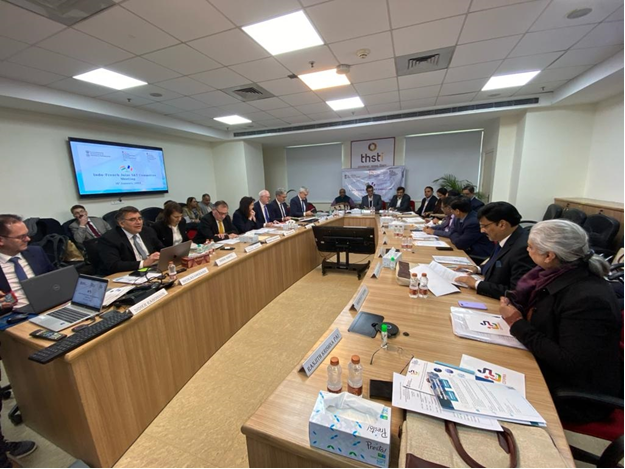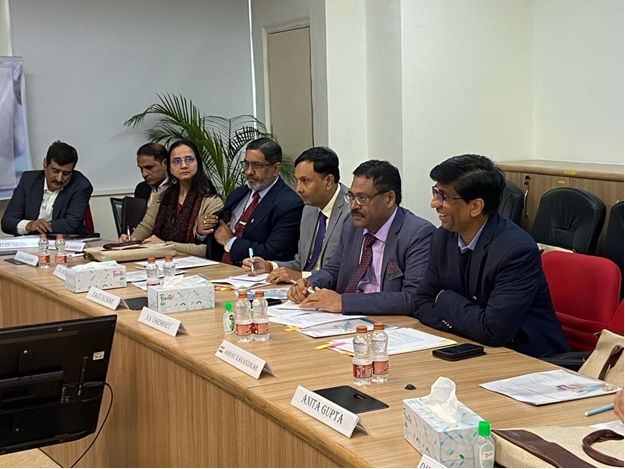The second meeting of the Indo-French Joint Committee of Science and Technology (JCST) which took place on January 18, 2024, discussed ways of catalyzing a stronger and rejuvenated Indo-French scientific partnership.
The Committee was co-chaired by Prof Abhay Karandikar, Secretary for the Department of Science and Technology (DST), Ministry of Science and Technology, Government of India and Dr Claire Giry, Director General for Research and Innovation at the French Ministry of Higher Education and Research.
Professor Karandikar highlighted the success of the CEFIPRA model as a catalyst of Indo-French Collaboration and said that it could help step up research partnerships in new age technologies like ICPS, health, clean energy, AI, quantum technologies, and advanced materials. He also underscored the need for more collaboration between the innovators and entrepreneurs of the two countries.
“There is a need for stronger associations between researchers of the two countries focusing on sustainable technologies, applied mathematics, health and ocean research,” said Dr Claire Giry.

The meeting was held on the premises of the Translational Health Science and Technology Institute (THSTI) where the committee was convened on the margins of the India International & Science Festival (IISF), which is one of India’s main scientific outreach events.
The scientific collaboration seamlessly aligns with the broader framework of the Indian and French strategic partnership, commemorated by Prime Minister Modi's visit to France on Bastille Day in July 2023, marking 25 years of collaboration in the Indo-Pacific region. The Indo-French roadmap “Horizon 2047”, signed on Bastille Day in Paris, underscores the commitment to bilateral scientific cooperation. The JCST, guided by the objectives of bilateral scientific cooperation, aims to identify thematic priorities, allocate resources, and enhance tools for achieving mutual goals.
The JCST was co-organized with the French Ministry for Europe and Foreign Affairs, represented by the Deputy Director for Cultural Diplomacy, and the delegates also included high-level representatives from the two countries, amongst which the CEO or deputy CEOs of French research institutes, the president of the French National Research Agency (ANR), representatives of the Indian Department of Science and Technology (DST), Department of Biology and Technology (DBT), Ministry of Earth Sciences (MoES), Council of Scientific and Industrial Research (CSIR), and Indian Council of Medical Research (ICMR) besides Director, Indo-French Centre for Promotion of Advanced Research (IFCPAR/CEFIPRA) and Director, Translational Health Science and Technology Institute (THSTI).
The two co-chairs reiterated that the JCST will catalyze a stronger and rejuvenated Indo-French scientific partnership. Speakers highlighted the vibrancy of Indo-French scientific cooperation and acknowledged the multitude of stakeholders and actions contributing to this dynamic relationship. The committee stressed the diversity and quality of the Indo-French academic and scientific cooperation, which relies on the mobility of scientists and joint research efforts, from fundamental to applied science involving notably industrial partners and Start-ups. The Indo-French Center for the Promotion of Advanced Research (CEFIPRA), financed by the Ministry for Europe and Foreign Affairs and the Indian Department of Science and Technology, has emerged since 1987 as a key instrument in this regard, playing a crucial role in structuring and sustaining the scientific partnership and will be instrumental to implement the priorities of the JCST in complement to the ANR-DST program.

Both parties have agreed to prioritize scientific collaboration in the thematic fields of Health, Decarbonized Hydrogen, Marine Sciences, and Applied Mathematics, with dedicated calls for projects to be announced soon. Notably, an agreement has been reached between ANR and DST to set up calls for proposals funding priorities set by the JCST. CEFIPRA, which should also be reinforced, will complement the ANR-DST calls to further fund other priorities highlighted.
Both parties also pointed out the key role of mobility and networking in preparing future cutting-edge scientific cooperation. They agreed to create ambitious new programs supporting the joint research, mobility of scientists, especially focusing on new cooperation and young researchers, while maintaining the existing programs devoted to women scientists, notably through CEFIPRA. The JCST members have stressed the significance of transdisciplinary approaches for overall better coordination, embedded in a long-term perspective on common initiative.
The outcomes of the committee are expected to be endorsed during the upcoming meeting between Prime Minister Modi and President Macron on Republic Day on the 26th of January.






























